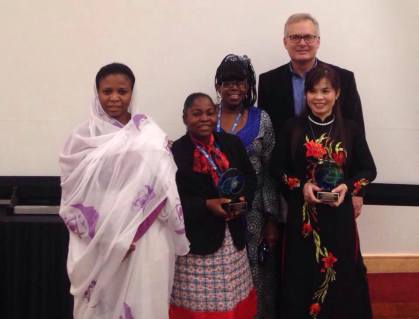
Women and minority scientists and engineers were honored at the AAAS Annual Meeting in San Jose. These are all PhDs and researchers in STEM fields representing Nigeria, Sudan and Vietnam. Hearing about the challenges they faced to establish labs, some conducting research in rural areas, given extremely limited resources and in places where women still are not encouraged to pursue higher education or science was a testament to their perseverance and resilience. It was a privilege to hear their stories and interview some of them.
Three of the five women pictured here (left to right):
Excerpt from the World Academy of Sciences for the advancement of science in developing countries (TWAS) website: “Dr. Nashwa Eassa, assistant professor of physics, Al Neelain University, Khartoum, Sudan (Arab Region) Nanoparticle Physics: For her research on a type of high-speed semiconductor, focusing on how to lessen the film that accumulates on its surface and interferes with the flow of electrical current. She is also involved in a project developing methods for using solar radiation to treat water and for splitting water molecules so that hydrogen can be collected.
Dr. Mojisola Oluwyemisi Adeniyi, head of the Atmospheric Physics/ Meteorological Research Group, Department of Physics, University of Ibadan, Nigeria (Sub-Saharan Africa Region)
Lower Atmospheric Physics: For her research using modeling to understand weather and climate, as well as atmospheric radioactivity, lightning and food security. Her research has shed light on when to best plant staple crops in Nigeria. She has also presented on efforts to improve the accuracy of climate models.
Dr. Adeniyi remarked, “Nigeria is growing in importance in the developing world and our science research capabilities will be a big part of that. I am thrilled that my contributions to my discipline are being acknowledged.”
Dr. Dang Thi Oanh, head of the Division of Science, Thai Nguyen
University of Information and Communications Technology, Vietnam (East
and South-East Asia & the Pacific Region)
Computational Mathematics: For developing algorithms that are used to
solve problems that are normally too complicated for computers. Her work
has helped to improve the accuracy of these methods, typically used for
solving problems in fields such as artificial intelligence and computer
graphics.”
“It is important that the world sees how women are contributing to the 21st century Vietnamese economy through science research,” said Dr. Oanh, “I am proud to be a part of this.”
